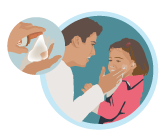Zika Prevention: Personal Protection Measures
Everyone can help prevent Zika transmission from occurring in Missouri by implementing two simple steps—control mosquitoes inside and outside your home and use personal protective measures to prevent mosquito bites and prevent sexual transmission.
Preventing Mosquito Bites
Zika is primarily spread through the bite of an infected mosquito. Zika can also be sexually transmitted and can be passed from a pregnant mother to her fetus during pregnancy. Because biting mosquitoes are the primary means of transmission it is very important to prevent mosquito bites.

Protect Yourself, Family, Friends and Neighbors from Mosquito Bites
- Wear insect repellent on exposed skin and your clothing.
- Use Environmental Protection Agency (EPA) registered insect repellents with one of the following active ingredients:
- DEET
- picaridin
- IR3535
- oil of lemon eucalyptus, or para-menthane-diol
- 2-undecanone
- EPA registration means that the product is effective in repelling mosquitoes. EPA-registered insect repellents have proven safe and effective even for pregnant and breast-feeding women.
- Always follow the product label instructions.
- Reapply insect repellent as directed.
- Do not spray repellent on the skin under clothing.
- When using sunscreen, apply the sunscreen before applying insect repellent.
- The effectiveness of natural insect repellents (non-EPA registered) is unknown against diseases like Zika.
- Wear long-sleeved, loose fitting, light colored shirts and pants when possible.
- Treat clothing and gear with permethrin or purchase permethrin-treated items.
- Treated clothing remains protective after multiple washings. See product information to learn how long protection will last.
- If treating items yourself, follow product instructions carefully.
- DO NOT use permethrin products directly on the skin.
- Stay in places with air conditioning and window and door screens to keep mosquitoes outside.
- When staying outdoors sleep under a mosquito net if you are not able to protect yourself from mosquito bites.
- Take steps to control mosquitoes inside and outside your home.
Protect Your Child from Mosquito Bites
- Do not use insect repellent on babies younger than 2 months old.
- Do not use products containing oil of lemon eucalyptus or para-menthane-diol on children younger than 3 years old.
- Dress your child in clothing that covers arms and legs
- While outside, cover crib, stroller and baby carrier with mosquito netting.
- Do not apply insect repellent onto a child’s hands, eyes, mouth or cut or irritated skin.
- Adults: Spray insect repellent onto your hands then apply to a child’s face.

Adults should spray insect repellent onto their hands, then apply to child’s face.
Preventing Sexual Transmission

A person with Zika virus can pass it to his or her sex partners. Zika can be passed before symptoms start, while the person has symptoms, and after symptoms end. Recent evidence indicates that an infected person can also transmit Zika virus to a sex partner even if the infected person never shows any symptoms of disease. Scientists do know the Zika virus remains present in semen longer than in other body fluids, including vaginal fluids, urine, and blood. Those living in or traveling to areas where Zika is circulating should take extra precautions to prevent the sexual transmission of Zika. The timeframe for using condoms or waiting to have sex will vary based on the couple’s situation and concerns. Not having sex can eliminate your risk of getting Zika from sex.
Protect your Partner from Zika

- If traveling to or living in areas where Zika is being actively transmitted, use condoms from start to finish every time you have sex.
- Men who traveled to an area with active Zika transmission but did not develop symptoms should use condoms for at least six months after leaving that area.
- Because Zika can cause certain birth defects, take steps to prevent your partner from getting Zika during pregnancy or from becoming pregnant.
- If you suspect you have or had Zika tell your doctor or healthcare provider.
- Share what steps you have or haven’t taken to prevent mosquito bites.
- Share if you have had unprotected sex.
If you have been diagnosed with Zika virus, CDC recommends condoms should be used for at least six months after you have recovered to prevent the spread of Zika.
Couples Who Are Pregnant

- Pregnant couples with male partners who live in or travel to areas with Zika should take steps to protect their pregnancy. Because Zika can cause birth defects, these couples should:
- Use a condom every time they have sex or do not have sex during the pregnancy.
- To be effective, condoms must be used correctly from start to finish, every time you have vaginal, anal, and oral (mouth-to-penis) sex. To learn more about condom safety, visit the CDC.
- A man who has Zika can pass it to his pregnant partner during sex, even if he does not have symptoms at the time, his symptoms have gone away, or even if he never develops symptoms.
Couples Trying to Become Pregnant

- Men or women who live in or travel to an area with Zika who are concerned about trying to get pregnant should talk to their healthcare provider.
- For women and men who have been diagnosed with Zika virus disease or who have symptoms of Zika after possible exposure to Zika virus, CDC recommends that healthcare providers
- Advise women to wait at least eight weeks after their symptoms first appeared before trying to get pregnant.
- Advise men to wait at least six months after their symptoms first appeared before trying to get their partner pregnant.
- Men should correctly and consistently use condoms for vaginal, anal, and oral (mouth-to-penis) sex or not have sex during this time period if they are concerned about the possibility of transmitting Zika virus to their sex partners.
- For men without symptoms of Zika virus but who had possible exposure to Zika from recent travel or sexual contact, healthcare providers should recommend their patients wait at least six months after their possible exposure before trying to get their partners pregnant. Women who do not develop symptoms should wait at least eight weeks before becoming pregnant.
- Men and women without symptoms of Zika virus who live in an area with active Zika transmission should talk with their healthcare providers about their pregnancy plans during a Zika virus outbreak, the potential risks of Zika, and how they can prevent Zika virus infection during pregnancy.
Others Concerned About the Sexual Transmission of Zika

- Anyone concerned about the sexual transmission of Zika and not concerned about pregnancy can consider using a condom every time they have vaginal, anal, and oral (mouth-to-penis) sex or not have sex. To be effective, condoms must be used correctly from start to finish, every time during sex.
- For couples with a male partner who has traveled to an area with Zika, CDC recommends:
- The couple should consider using condoms or not having sex for at least six months, even if the male partner doesn’t develop symptoms.
- For couples with a male partner living in an area with Zika, CDC recommends:
- If the male partner has been diagnosed with Zika or has (or had) symptoms, the couple should consider using condoms or not having sex for at least 6 months after symptoms begin.
- If the male partner has never developed symptoms, the couple should consider using condoms or not having sex while there is Zika in the area.
- For couples with a non-pregnant female partner who lives in or has traveled to an area with Zika
- Couples should consider using condoms or not having sex.

If you suspect you have or had Zika tell your doctor or healthcare provider.
- Share what steps you have or haven’t taken to prevent mosquito bites.
- Share if you have had unprotected sex.
